Five Mistakes We Make That Damage Our Mental Health
Five Mistakes We Make That Damage Our Mental Health

Written By: Kelly Chan Jia Li, Clinical Psychologist (MAHPC(CP)00353)
Mental health is a crucial topic that is frequently discussed in today’s world. We talk a lot about self-care and stress management, but sometimes, without even realising it, we engage in behaviours that can harm our mental well-being. Today, let’s explore the five common mistakes that can negatively impact our mental health and how we can avoid these mistakes.
Common Mistake 1: Ignoring Our Emotions

Since young, many of us have been taught to “keep it together” or “stay strong” during tough times. While resilience is important, ignoring or suppressing our emotions can lead to more significant mental health issues. If you constantly brush off or bottle up the feelings of sadness, anger, or anxiety, these emotions do not just disappear. They get buried and can manifest in harmful ways, which can lead to more severe mental health issues such as depression, anxiety or stress.
What Does It Look Like?
Imagine you had a difficult day at work. Instead of acknowledging your frustration, you tell yourself, “It is not a big deal”, and push the frustration aside. Over time, this ignored emotion builds up. One day, you might snap at someone over something small without reason. These reactions are your body’s way of releasing the pent-up emotions you have suppressed.
How to Avoid This:
- Acknowledge your feelings: Do allow yourself to feel. Recognise when you are feeling stressed or anxious.
- Express your emotions healthily: You can practice journalling, breathing activities or engage in self-care activities.
- Seek support: You can talk to friends, family, or a therapist about your emotions.
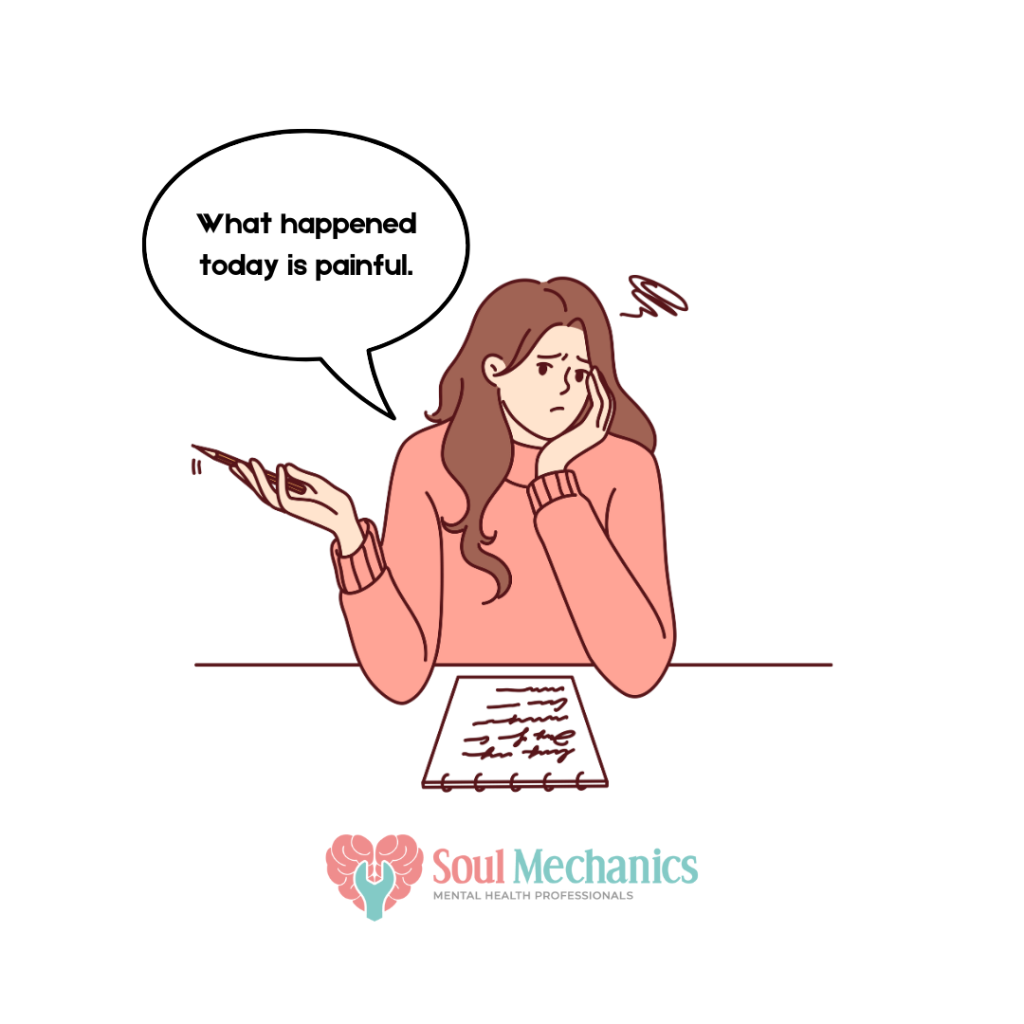
Common Mistake 2: Overworking and Not Prioritising Rest
It is easy to fall into the trap of overworking. Whether it is staying late at the office, constantly checking emails, or filling every minute of your day with tasks, neglecting rest can negatively impact your mental health. When we do not give ourselves time to unwind, our stress levels remain high, which can lead to burnout, anxiety, and even physical health problems.
What Does It Look Like?
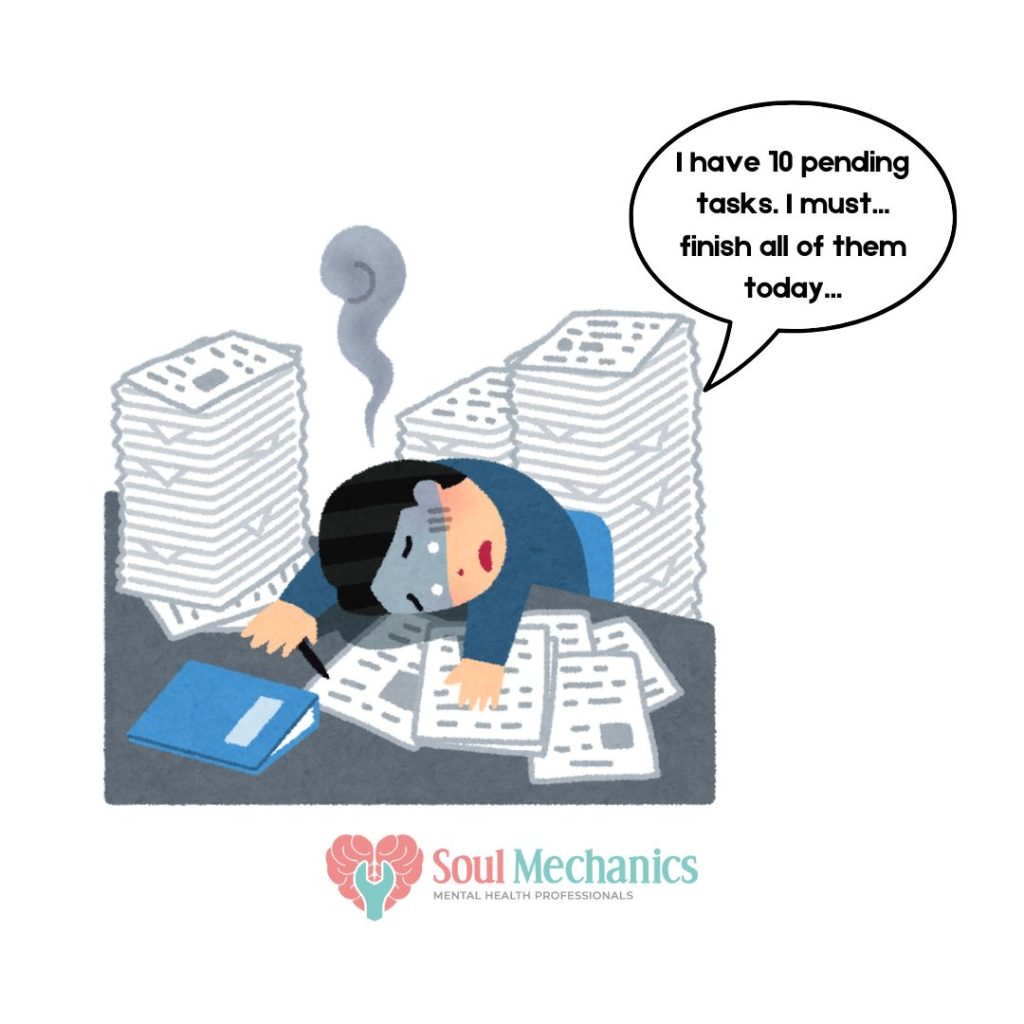
Let’s say you have been working non-stop on a project for weeks, pulling all-nighters and skipping weekends. You start to notice that you are feeling irritable, having trouble sleeping, and having difficulty focusing on work. These are signs that your mind and body are asking for a break. If you ignore these signs and keep pushing, you might get completely burned out, and even simple tasks feel overwhelming.
How to Avoid It:
- Schedule downtime for self-care activities: Try to set aside time each day for relaxation and activities you enjoy, such as taking a short walk, journalling, or listening to relaxing music.
- Prioritise your sleep: Ensure you get adequate sleep each night to recharge your body and mind.
- Take regular breaks: You can incorporate daily breaks to reduce stress and prevent burnout.
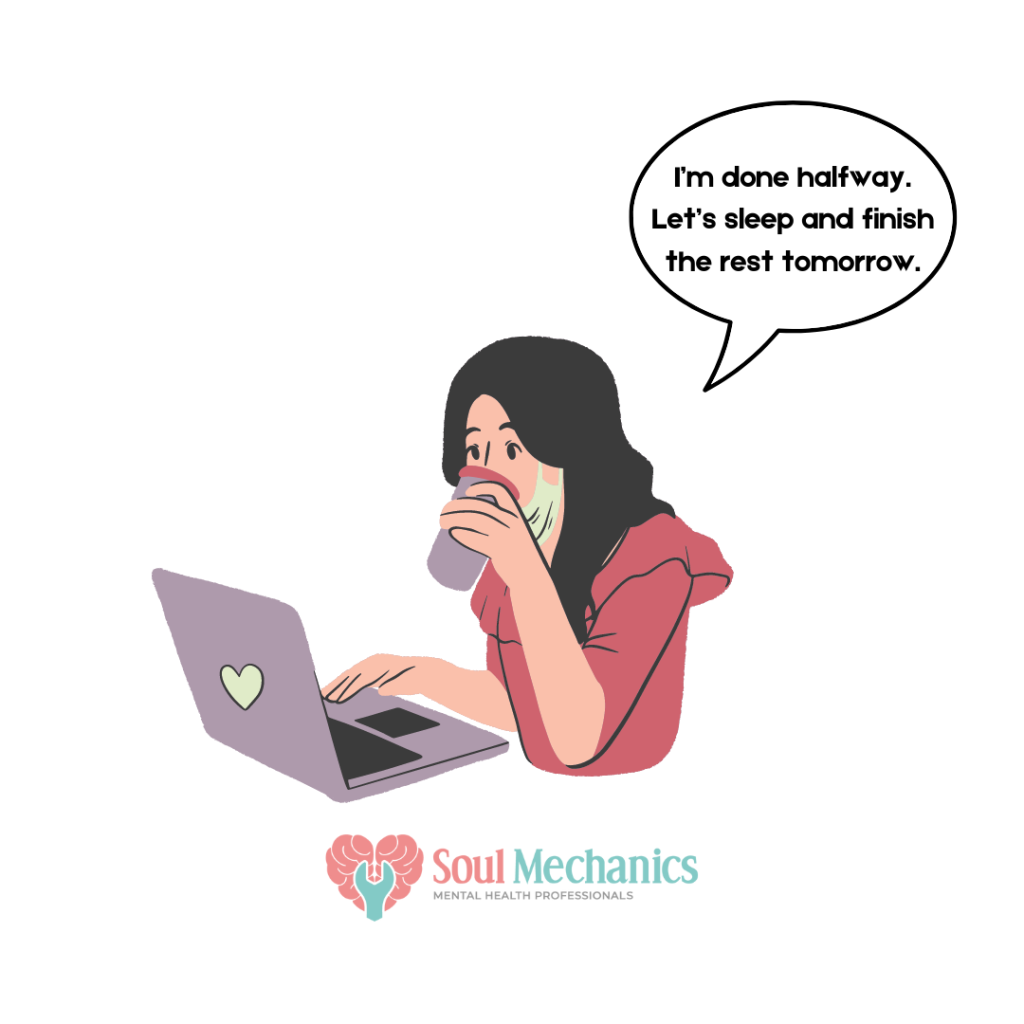
Common Mistake 3: Comparing Ourselves to Others
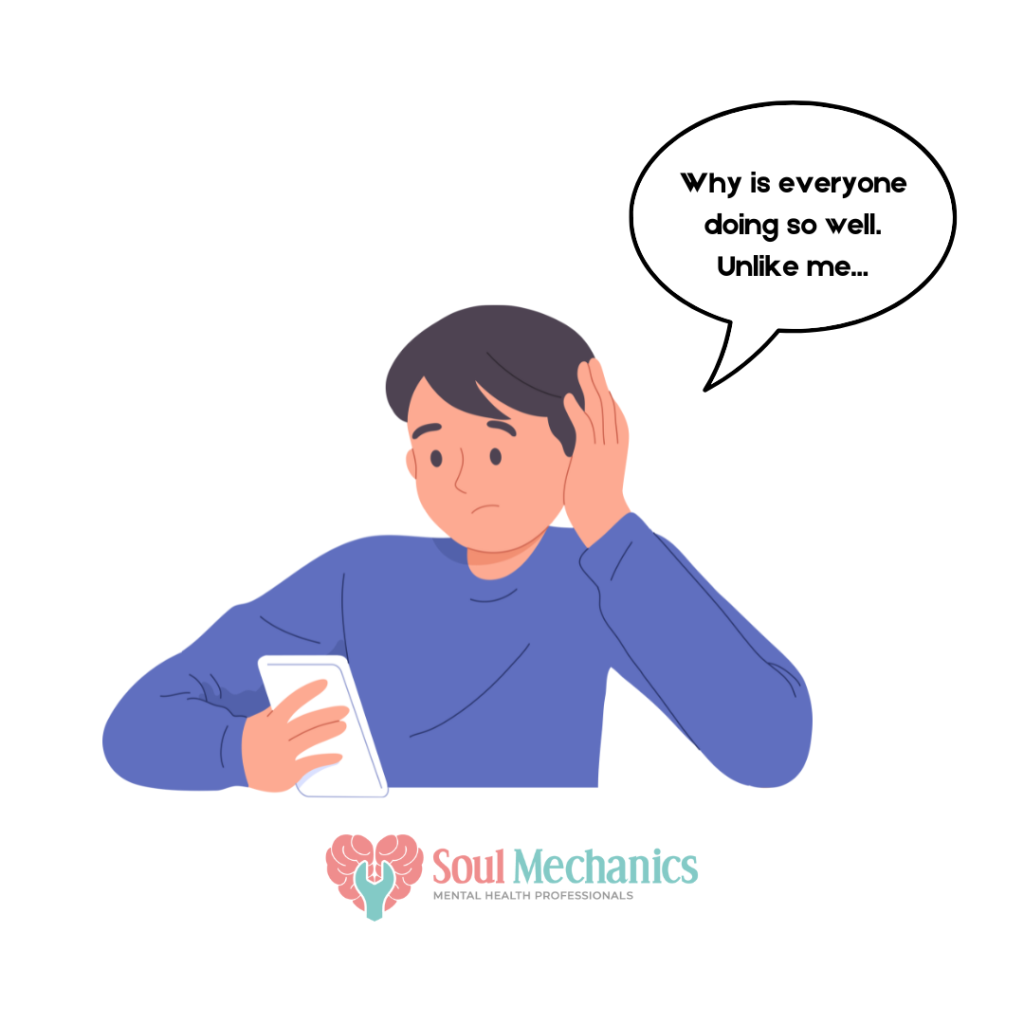
With social media at our fingertips, it is easier than ever to compare ourselves to others. We scroll through social media and see others with seemingly perfect lives, and it can make us feel like we are not measuring up. This constant comparison can lead to feelings of inadequacy (e.g., criticising ourselves harshly or doubting our abilities), low self-esteem, and even depression.
What Does It Look Like?
Let’s say you are scrolling through Instagram and see a post from an old classmate who just got promoted at work and bought a new house. Your classmate seems to have a perfect life, but you are struggling with your job, feeling unsure about your future, and barely making ends meet. It is natural to compare, but doing so can make you feel like you are not good enough.
How to Avoid It:
- Setting goals for yourself: Try to set personal goals using SMART goals to measure your progress against your own standards, not others.
- Limit social media use: Let’s be mindful of your time spent on social platforms. Remember that what you see online is often a highlight post, not the whole picture. Everyone has struggles and challenges that they might not share publicly.
- Practice gratitude: You can regularly reflect on what you are thankful for. Practising gratitude for what you have can also help shift your mindset from comparison to contentment.

Common Mistake 4: Isolating Ourselves
When we are feeling down, it can be tempting to retreat from the world and avoid social interactions. While some alone time can be healthy, too much isolation can exacerbate feelings of loneliness and depression. Human beings are social creatures, and we thrive on connection. When we cut ourselves off from others, we miss out on the support and joy relationships can bring.
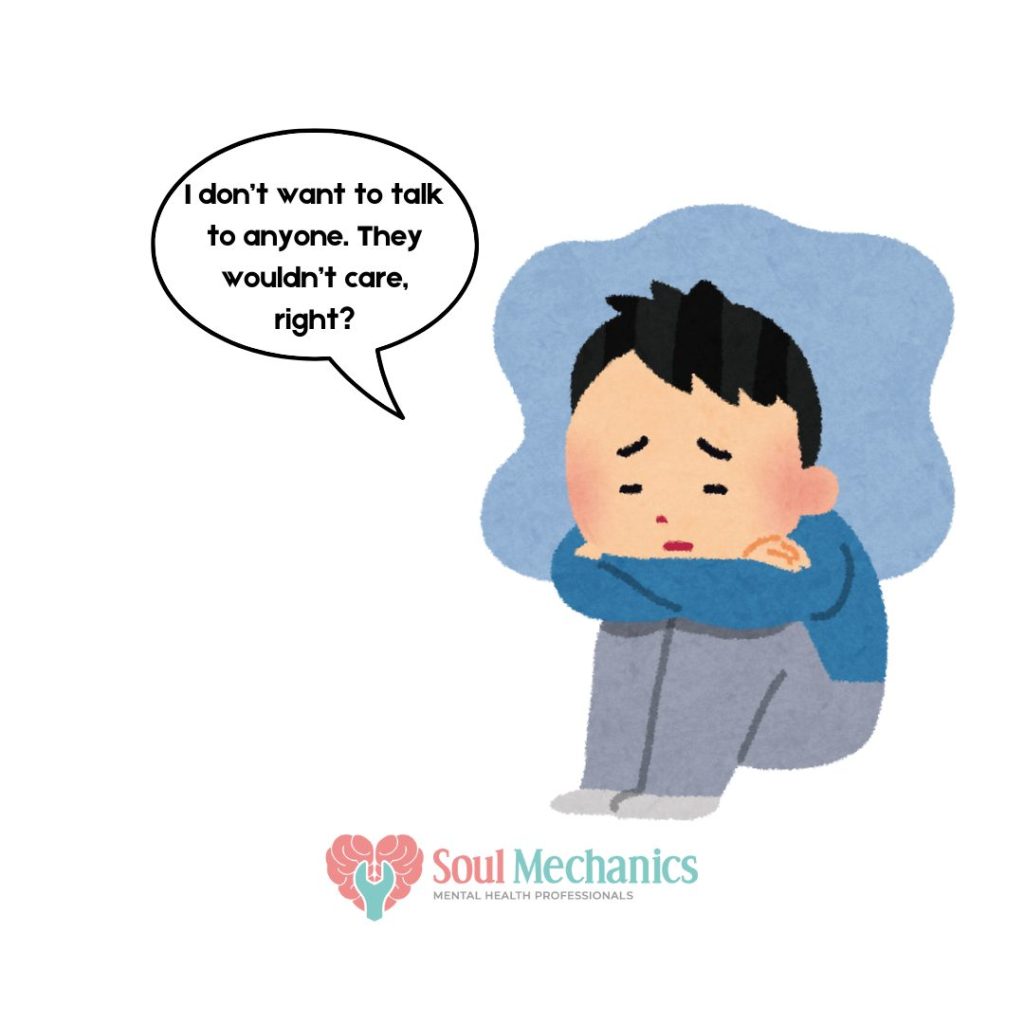
What Does It Look Like?
Let’s imagine that you are now going through a breakup. You might feel too sad to meet your friends or go out, so you stay home and avoid socialising. At first, it might feel like the right thing to do. After all, it would be best if you had time to heal. But after a while, you might notice that the longer you isolate yourself, the worse you feel. You start to feel disconnected from others, and your sadness deepens, leading to feelings of loneliness and emptiness.
How to Avoid It:

- Reach out to others: Try to make an effort to connect with friends or family, even just by making a quick call or text. It might feel like the last thing you want to do, but connecting with friends or family can lift your mood.
- Start small: You do not have to immediately jump back into social life. You can start with small steps, like calling a friend or walking with someone.
- Join support groups or clubs: You can join groups that share your interests to meet new people.
Reminder: If you or your loved ones are struggling with mental health, please don't hesitate to reach out to us at Soul Mechanics KD or Soul Mechanics Ipoh. Remember, seeking help is not a sign of weakness but strength!
Common Mistake 5: Avoiding Professional Help
Many of us may hesitate to seek help from a mental health professional due to stigma, fear, or the belief that we should handle our problems on our own. However, avoiding professional help can prevent us from getting the support we need to improve our mental health. This can lead to worsening mental health issues, prolonged suffering, and difficulty coping with life’s challenges.
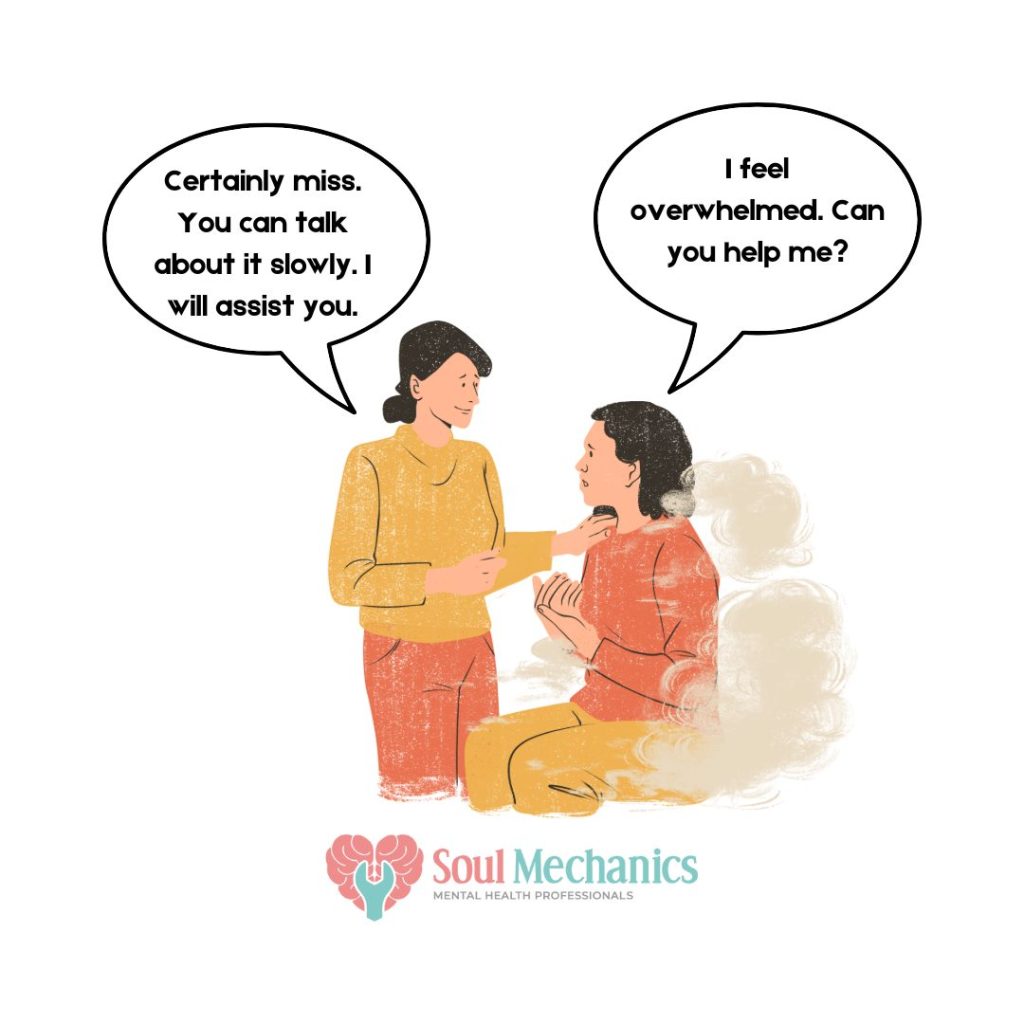
What Does It Look Like?
Let’s say you have been feeling anxious and overwhelmed for months, but you keep telling yourself that you can manage it on your own. Despite your best efforts, your anxiety is not improving, and it is starting to interfere with your work, relationships, and daily life. By avoiding professional help, you are missing out on the support that could help you feel better.
How to Avoid It:

- Acknowledge the need for help: Let’s recognise when you need support. Always remember that seeking help is a sign of strength, not weakness.
- Educate yourself: You can learn about the benefits of therapy and how it can help you manage your mental health more effectively.
- Take the first step: You can make an appointment to reach out to a mental health professional, even if it feels daunting. It is okay to seek help.
Be The Agent of Change for Yourself
Our mental health is a crucial part of our overall well-being, and it is essential to be mindful of the behaviours that can impact it. Recognising these five common mistakes can allow us to take proactive steps towards a healthier mind and a more fulfilling life. Remember, small changes can make a big difference, and it is never too late to start taking better care of yourself.
If you enjoyed reading this, why not broaden the horizon of knowledge by learning about "Insights to Effective Therapy: Therapy Do’s and Don’ts"? You can read the blog here.
For more content related to mental health do follow us on our official Instagram.

